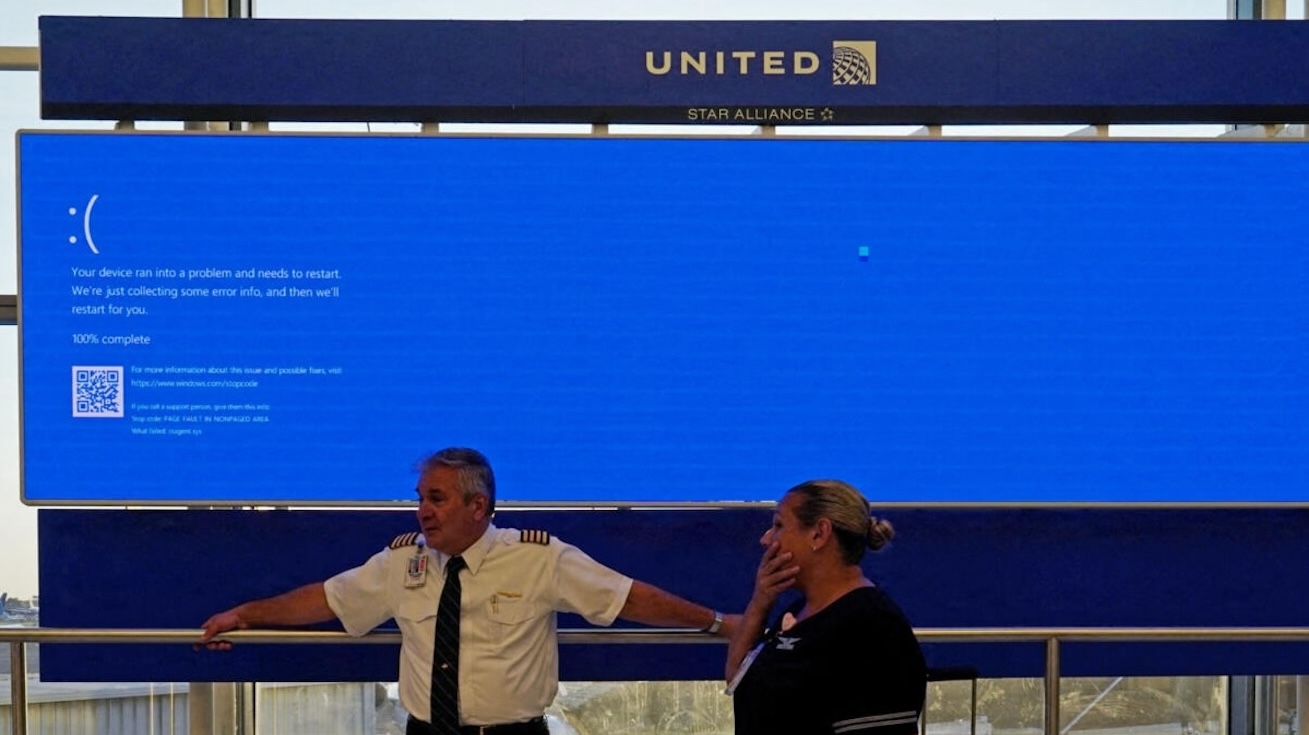CrowdStrike Global Outage Shows the Serious Dangers of a Digitised World. Why China wasn’t Hit

In the cover image the screen of informatic system of Newark Airport in the US
Originally published by The Daily Sceptic
The perils of over-reliance on digital systems have been once again highlighted by the crashing of computer systems around the world due to an update to the Falcon antivirus and security product from CrowdStrike affecting its interaction with the Windows operating systems.
The update has caused chaos for banking, retail, railways, airports, healthcare and for a wide range of other businesses and infrastructure where the Falcon software runs on Windows systems. Advice for bringing affected computers back into working order has been published, but the exact mechanism by which the update caused “Blue Screen of Death” errors does not appear to have yet been reported.
The perils of over-reliance on digital systems
It appears that in many cases, while the update was distributed automatically over the internet to systems, the workaround to fix the problem requires the machines to be rebooted in Windows’ safe mode, which usually requires physical access. The person at the keyboard then needs to know the password for the computer’s administrator account, and use this level of access to delete a file within a subdirectory of Windows’ System32.
This process can be more complicated where Microsoft’s BitLocker encryption is in use. In many organisations, the recovery keys for BitLocker have themselves been stored on a computer unable to start properly due to the CrowdStrike update. The quote “Men go mad in herds, while they only recover their senses slowly, one by one”, originally from Charles Mackay in 1841, seems applicable now to computers too. They crash en masse, then require individual attention before they will work again.
It should be noted that while the perils of centralisation with a physical single point of failure are obvious to all but technocratic politicians and civil servants, this massive outage shows another way in which a “single point” of failure can occur. The single point in this case is not a particular server in one building somewhere on the planet; but rather a change within a single piece of software with that change then being rolled out to many individual systems around the globe.
Advocates of Central Bank Digital Currencies (CBDCs) should consider these lessons.
These systems then entered a state euphemistically described as Total Inability To Support Usual Performance (acronym intentional) among the tech community. There was a reason that NASA put a fifth backup flight computer in the space shuttle, running software written entirely independently of the software on its primary four computers. A single point of failure where software is concerned doesn’t have to happen at only a single point in space.
There is a very clear lesson to be learned here. Systems which can collapse at scale, even when they are not centralised in the physical sense, eventually will collapse in such a fashion. Advocates of Central Bank Digital Currencies (CBDCs) and Digital ID systems should consider these lessons. This update ‘only’ knocked out an estimated 8.5 million computers, belonging to over 24,000 organisations that subscribed to CrowdStrike’s Falcon software. A country reliant on a CBDC instead of cash would see an end to all transactions as a consequence of a similar failure affecting a component within whatever software stack was being used to operate CBDC infrastructure.
That could mean a fault within the software on physically centralised or partly centralised servers logging transactions and holding records; or a fault within the software running on masses of devices operating as payment terminals in a wide variety of locations. In that dystopian CBDC-dependent nation, one would be looking at electric vehicles (already a bad idea simply on account of the abysmal energy density of batteries compared to chemical fuels) stranded at charging stations, unable to make payments to initiate the charging procedure. Consider that the World Economic Forum once advertised with slogans on the theme of “what if extreme weather froze your bank account”, right at the time when Justin Trudeau was freezing bank accounts on account of his extreme intolerance for peaceful protest.
The reality is that in the centralised totalitarian model of society the WEF hungers for, this scenario becomes more probable, not less. That is to say, that as well as increasing the opportunities for censorship-obsessed elites to deliberately interfere in people’s lives, centralisation also increases the vulnerability of a society to accidental errors.
The centralised totalitarian model of society the WEF hungers
Where Governments dream of requiring digital ID or age verification for internet access, or client-side scanning to look for objectionable opinions and only allow messages to be sent when approved as sufficiently “double plus good”, one can even imagine a situation where direct messages and online posts attempting to report a fault in the software stack running the verification or approval algorithms would be blocked from being sent. This wouldn’t need to be a matter of a deliberate attempt to cover up the fault, but instead the inability to report the fault would be a natural consequence of the fault itself. A censorship apparatus built on a principle of scanning everything before it can be shared ends up censoring absolutely everything if it is unable to perform scans.
Where old systems, like cash, just work, the alternatives which Big Tech and Big Government claim are more convenient can collapse. Where computer systems you actually own and have true control over just work, systems which can be remotely updated can crash catastrophically. When Big Government pushes for things to be more “secure”, it usually has in mind intrusive projects to stop “bad people” from using “SMART” systems, rather than measures to actually make systems more resilient in the event of crises. Government, after all, tries to whip up anger against truly secure encryption by describing it as warrant-proof, though in an age where lawfare is becoming common and courts allow the monitoring of vast numbers of innocent people it is hard to see how such a level of protection is undesirable.
Meanwhile, Big Tech companies seek to create an “experience” for users, which in practice comes to mean an ever more interlinked web of dependencies, often centred around a server to which the devices regularly phone-home to check that the user has the company’s permission to use the things they have bought. Concerningly, even farming has now become a field in which equipment manufacturers are displaying this ‘Big Tech’ attitude. This risks farmers’ livelihoods and entire nations’ food security in the event of software crashes. And that could include software crashes within Digital Rights Management subsystems of software which aren’t even there for the benefit of the user in the first place.
Humans, when acting like machines and believing that adherence to procedure, policy, legislation or guidance is more important than common sense and morality, make the perils of centralisation still worse. If one adds a human element with a sufficiently jobsworth disposition and an absolute confidence in the infallibility of their systems to the toxic mix of centralisation and control freakery enabled by excessive digitisation, it results in horrific scenarios like those surrounding the Post Office’s Horizon software.
I shall enter a little further into speculation here when suggesting that a correlation between people having problematic dispositions and a desire for centralisation may exist, perhaps best demonstrated by the ways in which I have seen the supporters and opponents of cash behaving during previous payment infrastructure outages.
Contrast: the elderly woman who deposited exact change on the counter in a card-only cafe. She calmly claimed it was legal tender, whether that is an entirely applicable argument or not, and walked off with two packaged sandwiches. With: the student who upon being told, in broken English by the very polite man behind the fried-chicken shop counter, that VISA was down that day, raised his voice to a bellow. Such bellowing was perhaps difficult from behind the blue paper muzzle he was wearing in 2022. He then proceeded to accuse the owner of tax evasion in a lecture which lasted until everyone waiting around for their orders was glaring at him, and which contained expletives even someone fluent in English could be surprised by.
The consequences of centralisation-enabled failures.
While it is not my place to comment upon whether what the woman did was entirely legal, she gave the impression of someone who would start knitting socks for neighbours in a prolonged power-cut. The student gave the impression of someone who’d batter on doors in search of a USB powerbank with which to buy himself a while longer on TikTok. The types of people who cheer for centralisation do not appear to be the types who can foresee – much less aid in recovering society from – the consequences of centralisation-enabled failures.
Keeping to the theme of trendy people and trendy attitudes, it is also worth noting that whilst the update which led to the ongoing chaos may well have been intended as a security patch or as a bug fix for a rare software fault condition (and ended up creating a widespread one), many updates which have been responsible for widespread system failures in the past are updates to provide software with new ‘features’. Unfortunately, in keeping with trying to be fashionable brands, a lot more programming hours are dedicated to “oh, look, shiny” than to simply keeping abreast of actual functionality and security flaws which may require patching.
With software controlled systems embedded in ever more places (and not all of this increase in the ubiquity of computing necessarily has to be bad so long as the systems are properly under a user’s control and are not cloud dependent), it would seem a wise time for the practice of software development to start prioritising reliability, resilience and stability. It would be wise to prioritise these above the aim of innovating in ways nobody asked for, which then disrupt people’s workflows within products they are already using. While consumer technology is particularly affected by this fashion-based philosophy, business software is not immune.
The hype around AI with its latest eruption
This is particularly the case when buzzwords are used in efforts to market solutions to problems they might not have to bosses of limited technical expertise. Look at all the hype around AI, with its latest eruption coming in the form of Large Language Models. A world with software around every corner is a world which can’t afford that software to be updated, with the potential for introducing serious errors to it every time a corporate executive falls for a fad.
The way in which smaller open source software projects operate may provide an inspiration here, particularly where the project consists of a standalone tool for a particular task. In many such projects, there are only two scenarios in which a developer typically posts an update. Firstly, he may post one in response to user reports of errors being thrown in specific circumstances. Secondly there may be a need for a new version of the tool when changes are needed to maintain compatibility with changes that have been applied to other software, such as new releases of an operating system under which the tool may be run.
As an overall picture, centralisation makes it all too easy for governments and corporations to feed their addiction to exercising control. And the further their reach spreads, the closer the state comes to being a black hole that sucks in the entirety of society and human experience, the more damage their anti-Midas touch causes. And then, in its aftermath, the solution they always push for is more centralisation, more opportunities to make things worse whether by intention or by accident.
Escaping the headlong rush in to a new Soviet Union where nothing works and officialdom absolutely refuses to acknowledge the fact must be at the forefront of our minds when looking to the future. But the outage news itself can be summarised in a much shorter fashion. While one can feel sorry for those whose travel was disrupted, it is a wonderful feeling to jump to the front of a queue in a shop and pay a satisfied cashier with cash, whilst a seething mass of trendy woke-folk, who consider cash and even freedom itself to be outdated concepts, look on.
Dr. R P completed a robotics PhD during the global over-reaction to Covid. He spends his time with one eye on an oscilloscope, one hand on a soldering iron and one ear waiting for the latest bad news.
Originally published by The Daily Sceptic
Here Is Why The Blue Screen Of Death Didn’t Affect China
Extract by a post originally published by GreatGameIndia
While the “blue screen of death” in Microsoft Windows affected millions of users globally, affecting banks, airlines, hospitals, and hotels, China escaped mostly unscathed because it attempted to maintain technological independence and self-sufficiency.
Chinese industry players and experts stated on Sunday that the global cybersecurity concerns raised by the Windows outage, which was caused by a faulty update in third-party cloud software and rendered millions of computers inoperable, underscored the significance of tech independence reports Global Times.
Analysts also pointed out that nations cannot rely on other companies for their economic and national security, since a single company’s error might cripple half of the world. To lessen their reliance on US tech companies, they advised other nations to conduct their research and development or to diversify their suppliers.
Conditional Immunity
According to media sources, an American cybersecurity technology company called CrowdStrike released a Windows software update on Friday that caused widespread disruptions in public services, halted payment networks globally, and suspended flights.
In China, the software breakdown had a far smaller effect. Experts stated that the technical malfunction had little effect on important infrastructure located throughout the Chinese mainland, including banks, airports, government agencies, and payment systems.
According to yicai.com, flight operations at airports throughout the Chinese mainland remained mostly regular since CrowdStrike cloud computing equipment was not sold there.
According to the study, just a few international hotel chains on the mainland were impacted by the incident, and domestic hotel companies like Home Inn and H World International were essentially unaffected.
“The majority of Chinese enterprises, especially state-owned companies as well as large private firms were largely unaffected,” Wang Liejun, a security expert from QI-ANXIN Technology Group Inc, told the Global Times on Sunday.
Wang pointed out that because CrowdStrike may have been installed on the computers of international businesses or their branches operating in China, the Microsoft outage may have had an impact on them.
According to Kong Xiangyan, head of 360 Endpoint Security department, the Global Times on Saturday, “Our early implementation of a replacement plan involving domestic hardware, operating systems, and application software can be greatly credited for the incident’s limited impact in China.”
“Domestic government and business entities have a large user base of Windows hosts, yet we were almost unaffected by such a large-scale incident. This is because Chinese users can choose their own security products. This highlights to domestic entities, from government to individual users, the significant importance of China’s self-reliance and strength in the cybersecurity industry and technology,” Xiao Xinguang, a member of the National Committee of the Chinese People’s Political Consultative Conference and chief software architect from Chinese cybersecurity company Antiy, told the Global Times on Sunday.
Experts observed that in the context of the US’s tech war against China, which prevents foreign hardware and software from entering the Chinese market, China has increased its attempts to achieve tech independence. Rather, they said that China’s quick scientific advancement is a result of US pressure.
China’s ability to prevent cybersecurity breaches in the face of a complicated external environment is demonstrated by its relative resilience to the global outage. Furthermore, Wang Peng, an associate research fellow at the Beijing Academy of Social Sciences, stated on Sunday that this has increased domestic users’ trust in domestic network security software and given more market opportunities for domestic brands because Chinese enterprises primarily use domestic antivirus software and were less affected by this incident.
Businesses and individual users alike should understand that it is challenging for a single technology or product to offer complete security protection, according to Wang Peng, who spoke with the Global Times. Thus, it is necessary to set up a diverse network security protection system that uses several security technologies.
Extract by a post originally published by GreatGameIndia




That’s really very strange, because I read a rather very lengthy article about CrowdStrike being a sort of spy ware, by the very means by which it transfers data, if I know that, and I’m an absolute nobody, then certainly these large corporations must also know it; so why do they use CrowdStrike? Are they all satellite spy agencies for the 5 eyes intelligence agencies? I wouldn’t be surprised, only criminals need to spy on others and the US appears to be composed almost entirely of criminals; at least within its Judicial, Executive and Congressional branches, including all its State governments as well. The US most basic symbol isn’t the bird but rather the snake; so, of course, that’s what we are, “snakes in the grass”; it’s what makes us healthy, wealthy and wise.